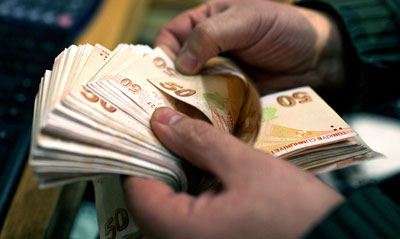Investors Keep Pulling Cash Out of Turkey

-
Foreign investors withdrew $7.6 billion from stocks, bonds
-
Capital Economics sees lira, bonds extending declines
Foreign investors look set to keep pulling their money out of Turkey after dumping a record amount of stocks and bonds this year.
Investors from abroad withdrew $7.6 billion from assets in 2015, including $1.4 billion in outflows last month as the party that President Recep Tayyip Erdogan helped found swept back into power, initially triggering a rally in the nation’s assets. Declines resumed as the war in neighboring Syria and Russian sanctions threatened the country’s $720 billion economy.
More selling will probably follow and a rout in the lira, on course for the biggest annual drop since 2008, is set to deepen, according to Capital Economics Ltd. and SEB AB. In addition to Turkey having the biggest current-account deficit as a percentage of output among the Group of 20 nations, concern is mounting that the new government’s overwhelming win in elections last month will allow it to put pressure on the central bank to cut rates with little political opposition.
“Markets have indeed welcomed the recent election, but I think they may be overly sanguine,” said William Jackson, senior emerging-markets economist at Capital Economics Ltd. in London. High levels of external debt make it vulnerable to shifts in investor sentiment once the U.S. starts increasing interest rates, weighing on the lira and bonds, he said.

The yield on 10-year debt rose eight basis points to 10.36 percent at 5:04 p.m. in Istanbul, bringing the increase in the past month to 51 basis points, the biggest among 24 emerging markets. The lira weakened 0.6 percent to 2.9088 against the dollar.
Per Hammarlund, chief emerging-markets strategist at SEB in Stockholm, projects the currency will drop 3.7 percent to 3 per dollar by the end of December. Jackson at Capital Economics forecasts a decline of 11 percent by the end of next year to 3.25, worse than the 3.08 median estimate in a Bloomberg survey.
A key question for investors is how free central bankers will be to set their policy agenda given President Erdogan’s track record of pushing for lower borrowing costs even as inflation accelerated and the lira weakened. They’re are also looking for evidence the government will adopt policies to improve competitiveness and stimulate growth from levels that are below the 10-year average.
“Foreign investors are not convinced that Turkey’s central bank will be allowed to decide on monetary policy independently,” Hammarlund said. The strong showing by the ruling party in elections risks exacerbating the situation, he said.
Not everyone is pessimistic. Credit Suisse Group AG recommended investors boost their holdings in Turkish stocks last week after a selloff that dragged down valuations.
Credit Risks
The slump in oil prices this year helped Turkey post current-account surpluses in August and September, the first back-to-back positive flows since 2004. That will help narrow this year’s shortfall to an estimated 5 percent of economic output.

Even so, Turkey is among emerging markets with rising private-sector debt, increasing the dependency on external financing and threatening sovereign credit ratings, Fitch Ratings said in a report last week. Moody’s Investors Service cited Turkey’s “large external funding needs” and geopolitical risks among reasons for keeping a negative outlook on the country’s credit rating on Friday.
Fitch and Moody’s rate Turkey at the lowest investment grade, and Standard & Poor’s ranks the sovereign one step below in junk.
“There are still many open questions about the future economic and reform programs,” said Dmitri Barinov, a money manager overseeing $2.6 billion for Union Investment Privatfonds GmbH in Frankfurt, who has small underweight in Turkey. “If Erdogan tries to stimulate growth via lower rates, it will prevent the current-account deficit from improving further and will only lead to a deterioration of the situation in the banking system. We need more clarity.”
Source: Bloomberg – Investors Keep Pulling Cash Out of Turkey





























